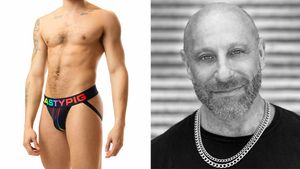Recent attention has focused on innovative medical developments that could dramatically reduce the number of new HIV infections. But ensuring access to health care and medication so that people can benefit from these developments is equally important.
While the epidemic has remained steady among much of the general population, it has continued to grow disproportionately among young African-American gay men and transgender women of color, especially in southern states.
The challenges for these communities are even greater than in other parts of the country. Southern states report some of the country's highest rates of poverty and HIV infection, have the greatest numbers of uninsured residents, and have incarcerated massive numbers of African Americans. Yet many of these states have refused to expand Medicaid under a new provision in the Affordable Care Act that would direct billions of federal dollars to provide low-income people with medical insurance and allow them to get life-saving health care.
Most recently, there has been a focus on PrEP, or pre-exposure prophylaxis, which the Centers for Disease Control and the World Health Organization are recommending to people who are at a high risk of infection. It involves taking a daily dose of Truvada -- a drug used for HIV treatment -- that, if used appropriately, can significantly reduce a person's risk of acquiring HIV. This is an exciting medical breakthrough, but the challenges of the HIV epidemic have proven repeatedly that there is no silver bullet.
Each year, an estimated 50,000 Americans are newly infected with HIV, and three-fourths of them are men who have sex with men. Among gay and bisexual men ages 13 to 24, black men are more than twice as likely as their white and Latino peers to become infected. Neither the states nor the federal government have developed accurate data for the transgender population, although findings suggest that transgender women experience infection rates at least as high as those among gay men.
A growing body of research, including the CDC's guidelines on reducing health disparities, indicates that the risk of acquiring HIV is mainly due to socioeconomic and demographic factors rather than individual behavior. Among these groups, an array of issues -- including poverty, discrimination, limited access to health care and housing, and mass incarceration -- help perpetuate the epidemic at disproportionate levels.
For black gay men and transgender people of color, racial segregation and small social networks, coupled with disproportionately high HIV infection rates, dramatically increase the risk of becoming infected, even from having sex without condoms just one time.
Among transgender women of color in particular, poverty and unemployment are extremely high, often leaving sex work as the sole option for survival and further increasing the risk of infection. The problem is made even worse because in cities like Los Angeles, New Orleans, and New York, police use condoms as evidence of prostitution, making sex workers, many of whom are transgender, afraid to carry them.
The CDC's new guidelines on PrEP suggest that about 500,000 people should be taking the drug, which costs $13,000 per person, per year. While it is covered by most insurers, and its manufacturer offers financial assistance to uninsured patients, fewer than 10,000 people are taking it. In some cases, concerns about stigma and potential side effects have contributed to low sign-up rates, while people in states that have refused to expand Medicaid who may wish to take the drug will face great difficulties in their attempts to access it.
PrEP has an important role to play as part of a broader strategy in the United States's response to HIV. State legislators should authorize Medicaid expansion to ensure that antiretroviral treatment is made available to all of those living with HIV. Local and state correctional authorities should make sure that new, and newly diagnosed, prisoners have immediate access to HIV medications, and that released inmates are linked to ongoing care and support. And police harassment, often directed toward queer people of color and including the confiscation of condoms as evidence of prostitution, should end immediately.
Successful responses to HIV are dependent upon the empowerment of communities most affected by the epidemic. PrEP will only become an effective strategy when policymakers and public health advocates tackle the intersecting effects of racism and inequality that have fostered the disparities before us.
ADAM FRANKEL is an associate with the Lesbian, Gay, Bisexual. and Transgender Rights Program at Human Rights Watch.













































































